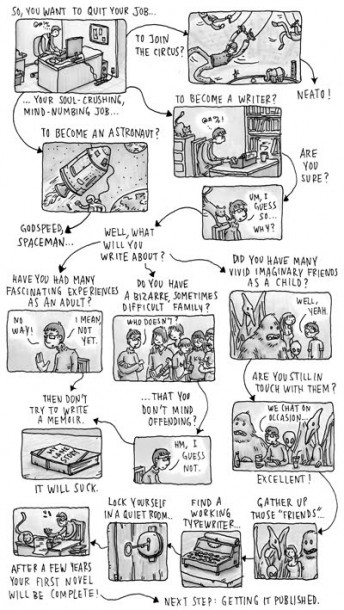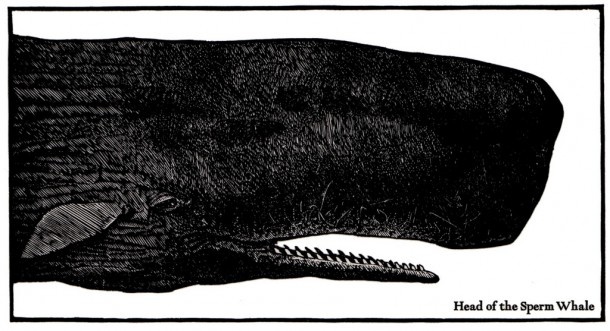Wanda Jackson – “Thunder on the Mountain” (with Jack White) (via myonetruevine)
Blog
How To Become a Writer

By Grant Snider.
Flaubert at Work
From Frederick Brown’s definitive biography of Flaubert, a typical day during the writing of Madame Bovary in 1851-56. Flaubert was 30-35 at the time.
Flaubert, a man of nocturnal habits, usually awoke at 10 a.m. and announced the event with his bell cord. Only then did people dare speak above a whisper. His valet, Narcisse, straightaway brought him water, filled his pipe, drew the curtains, and delivered the morning mail. Conversation with Mother, which took place in clouds of tobacco smoke particularly noxious to the migraine sufferer, preceded a very hot bath and a long, careful toilette involving the regular application of a tonic reputed to arrest hair loss. At 11 a.m. he entered the dining room, where Mme. Flaubert; Liline [Flaubert’s niece]; her English governess Isabel Hutton; and very often Uncle Parain would have gathered. Unable to work well on a full stomach, he ate lightly, or what passed for such in the Flaubert household, meaning that his first meal consisted of eggs, vegetables, cheese or fruit, and a cup of cold chocolate.… In June 1852, Flaubert [wrote in a letter] that he worked from 1 p.m. to 1 a.m. A year later, when he assumed partial responsibility for Liline’s education and gave her an hour or more of his time each day, he may not have put pen to paper at his large round writing table until two o’clock or later.
Malamud: “work in uncertainty”
To any writer: Teach yourself to work in uncertainty. Many writers are anxious when they begin, or try something new. Even Matisse painted some of his Fauvist pictures in anxiety. Maybe that helped him to simplify. Character, discipline, negative capability count. Write, complete, revise. If it doesn’t work, begin something else.
— Bernard Malamud (via Paris Review)
Enjoy the process of creation
Perhaps the most important quality, the one that is most consistently present in all creative individuals, is the ability to enjoy the process of creation for its own sake. Without this trait, poets would give up striving for perfection and would write commercial jingles, economists would work for banks where they would earn at least twice as much as they do at universities, and physicists would stop doing basic research and join industrial laboratories where the conditions are better and the expectations more predictable.
Mihaly Csikszentmihalyi, “The Creative Personality”
Fast Fish and Loose Fish

In a famous chapter of Moby Dick, Melville explains the law governing ownership of whales at sea.
It frequently happens that when several ships are cruising in company, a whale may be struck by one vessel, then escape, and be finally killed and captured by another vessel; and herein are indirectly comprised many minor contingencies, all partaking of this one grand feature. For example,— after a weary and perilous chase and capture of a whale, the body may get loose from the ship by reason of a violent storm; and drifting far away to leeward, be retaken by a second whaler, who, in a calm, snugly tows it alongside, without risk of life or line. Thus the most vexatious and violent disputes would often arise between the fishermen, were there not some written or unwritten, universal, undisputed law applicable to all cases.…
I. A Fast-Fish belongs to the party fast to it.
II. A Loose-Fish is fair game for anybody who can soonest catch it.
…What is a Fast-Fish? Alive or dead a fish is technically fast, when it is connected with an occupied ship or boat, by any medium at all controllable by the occupant or occupants,— a mast, an oar, a nine-inch cable, a telegraph wire, or a strand of cobweb, it is all the same. Likewise a fish is technically fast when it bears a waif [ed. note: a pole stuck into the floating body of a dead whale as a marker], or any other recognized symbol of possession; so long as the party wailing it plainly evince their ability at any time to take it alongside, as well as their intention so to do.
How to give a TED talk
A short documentary about what it takes to give a TED Talk.
“The thing is not to get self-conscious. It’s just like playing the piano. If you play the piano and suddenly start looking at your fingers … the music will stop.”
— Sir Ken Robinson
Photo of the Day
A record groove under an electron microscope, magnified 1000 times (via)
